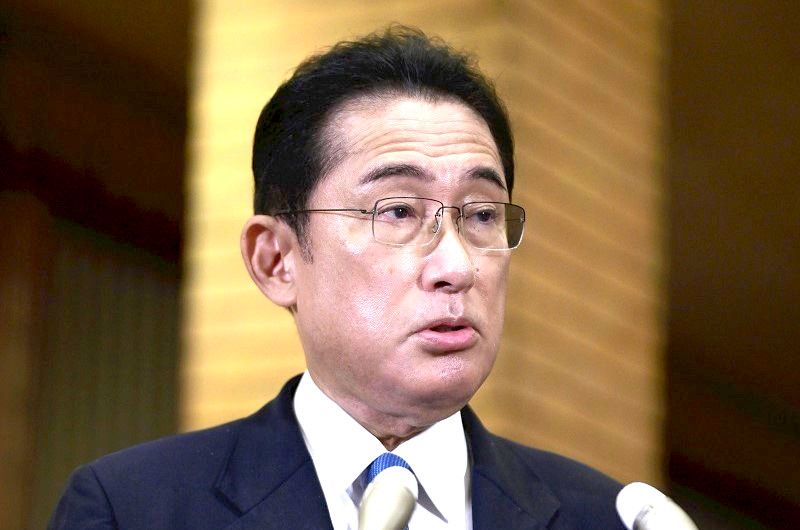Kishida Cabinet approval rating takes a hit from rising prices, Unification Church issue and Abe state funeral

Prime Minister Fumio Kishida speaks at the prime minister’s official residence on Sept. 30.
20:00 JST, October 3, 2022
More people say they disapprove of the Kishida Cabinet than those who approve of it, a recent nationwide poll conducted by The Yomiuri Shimbun found, sparking a strong sense of crisis within the government and ruling coalition.
The approval rating has fallen below 50%, and the political distrust over the issue of the Family Federation for World Peace and Unification (formerly the Unification Church) is so great that Prime Minister Fumio Kishida, who will have been in office for one year on Tuesday, has been forced to take a firm hand to his administration.
Anxiety and discontent
“Amid growing political distrust, commodity prices have also risen dramatically. [The decline in the approval rating] must be a sign of the public’s anxiety and discontent.”
This was how Koichi Hagiuda, chairperson of the Liberal Democratic Party’s Policy Research Council, analyzed the drop in the approval rating Sunday.
Even after the LDP announced the results of its investigation into the former Unification Church issue on Sept. 8, cabinet ministers and LDP lawmakers contact with the religious organization continued to be uncovered. Furthermore, from Oct. 1, food and beverage prices rose all at once due to soaring raw material and energy prices. This is believed to have contributed further to the drop in the approval rating.
A senior LDP official also pointed out that the opinion poll revealed a negative view of the state funeral for former Prime Minister Shinzo Abe even after it had been held.
“There are several factors contributing to the drop in the approval rating. It is as though the administration has had a complex fracture,” the senior official said, expressing a sense of crisis.
Push for economic action
The strength of the Kishida Cabinet had been its stability, with few scandals, and the cabinet’s approval rating had been solid.
Since The Yomiuri Shimbun began its regular survey of cabinet approval ratings, during the administration of Prime Minister Masayoshi Ohira in 1978, the second Abe Cabinet, inaugurated in December 2012, is the only one that has managed to maintain an approval rating of 50% or higher in its first year.
The government and the ruling parties hope to boost the administration by working out comprehensive economic measures that include steps to reduce the burden of electricity rates and the like, and by passing a second supplementary budget for FY2022, which will provide the financial source for the measures, at the extraordinary Diet session convened on Monday.
Hiroshige Seko, secretary general for the LDP in the House of Councillors, said on Sunday: “Commodity prices are the main concern for people. We must take quick and large-scale measures that will win the trust of the people.”
However, the issue of the former Unification Church continues to smolder over Economic Revitalization Minister Daishiro Yamagiwa, who is in charge of economic measures. Since the August cabinet reshuffle, his appearances at meetings related to the religious group have been revealed one after another. Calls for his resignation have even been raised within the ruling parties; as a veteran member of Komeito put it, “It will be less of a blow if he resigns the post as soon as possible.”
Yet, 180 out of the 379 Diet members of the LDP were found to have some links with the religious group. If the party makes a case for dismissing such members, it will be forced to take action every time a similar allegation arises, which could lead to a “domino effect” of resignations. Kishida is poised to attack the issue head-on, but there are concerns that “the debate in the Diet will become much tougher,” according to a former cabinet member of the LDP.
Opposition parties ready to question
The opposition parties are poised to step up their questioning over the issue in the extraordinary session of the Diet. Kenta Izumi, leader of the Constitutional Democratic Party of Japan (CDPJ), said the reasons why the approval rating has been overtaken by the disapproval rating are “[the administration’s] lack of explanation about the state funeral, its inadequate handling of the issue of the former Unification Church, and economic measures that have not reached the people.”
Katsuya Okada, CDPJ secretary general, said while in Takasaki, Gunma Prefecture: “The prime minister should remove Yamagiwa from the post. He is in charge of putting together the economic measures, but is it really appropriate [for him to do so]?”
Nobuyuki Baba, head of Nippon Ishin no Kai (Japan Innovation Party), criticized the government’s responses, saying, “The government’s responses have all been too late, whether it is the economic measures, or the issue related to the former Unification Church.”



